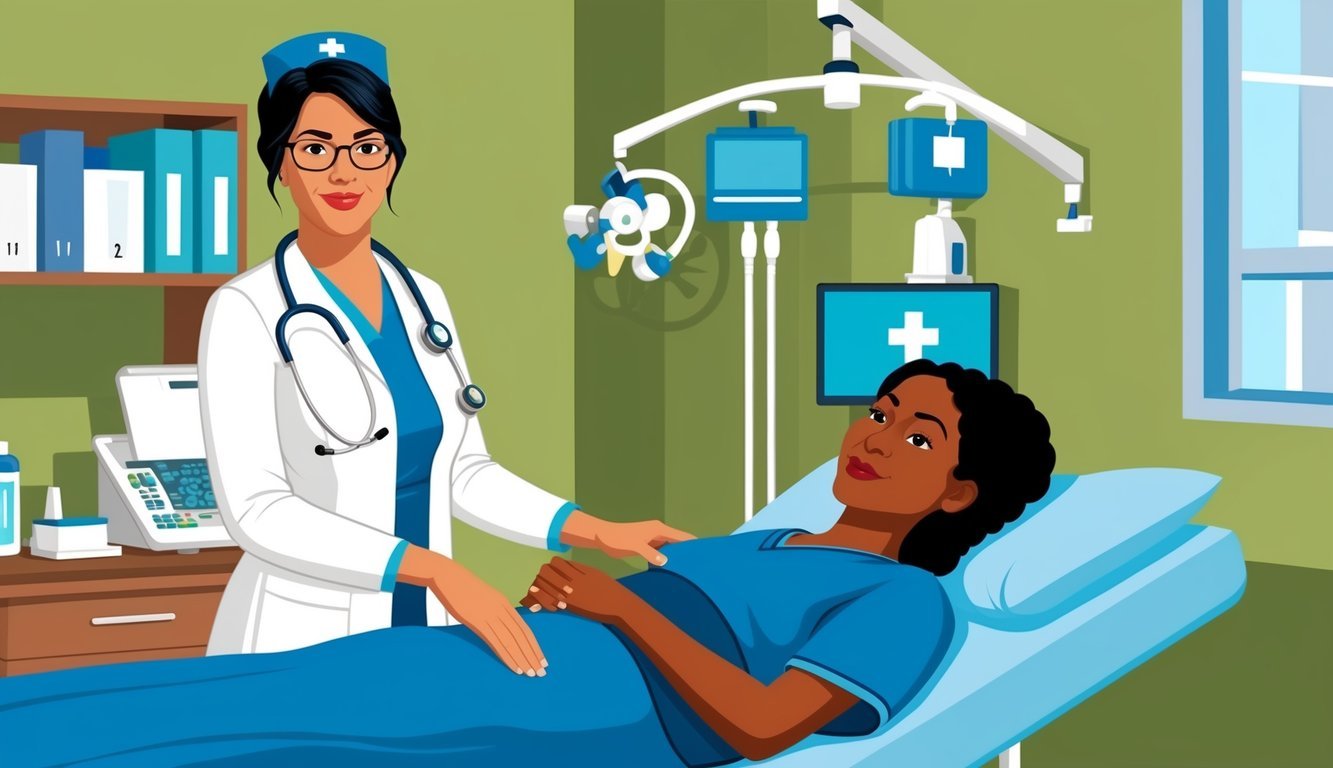Adult-Gerontology Nurse Practitioners (AGNPs) play a vital role in healthcare, focusing on the well-being of adults and the elderly. An AGNP is an advanced practice registered nurse (APRN) who specializes in diagnosing and treating patients across the lifespan, with a strong emphasis on age-related health issues. This specialized field requires a Master of Science in Nursing (MSN) and certification from recognized bodies such as the American Nurses Credentialing Center.
AGNPs are essential healthcare professionals who provide comprehensive care, including management of chronic diseases, acute illnesses, and preventive services.
To succeed in this role, you must hold a valid RN license and often seek additional certifications through organizations like the American Association of Nurse Practitioners.
By understanding the significance of the AGNP role, you can appreciate the impact these professionals have on the health of communities, particularly as the population ages.
Education and Certification Pathway

To pursue a career as an Adult-Gerontology Nurse Practitioner (AGNP), you must follow a structured education and certification pathway.
This involves obtaining an appropriate nursing degree, acquiring licensure, and seeking national certification.
Undergraduate and Graduate Nursing Education
Your journey begins with earning a Bachelor of Science in Nursing (BSN).
This typically requires four years of study, covering essential nursing principles and clinical practice.
Once you obtain your BSN, you can pursue a Master of Science in Nursing (MSN) with a focus on adult-gerontology.
Many programs offer flexible pathways, including online options, to accommodate your schedule.
Completing an MSN program often takes 2-3 years.
Some institutions provide a Doctor of Nursing Practice (DNP) option for those seeking advanced leadership roles in healthcare.
Licensure and National Certification
After completing your graduate education, you must obtain an RN license.
This involves passing the National Council Licensure Examination (NCLEX-RN), which assesses your nursing knowledge and competency.
Following licensure, you can pursue national certification as an AGNP.
Certification is offered by organizations like the American Nurses Credentialing Center (ANCC) and the American Association of Nurse Practitioners (AANP).
This step is crucial, as it validates your specialized skills and knowledge in adult-gerontology care.
Specialization in Adult-Gerontology
Focusing on adult-gerontology requires specialized knowledge in areas such as chronic disease management, acute care, and preventive health.
Many MSN programs include clinical rotations specific to this demographic, enhancing your expertise.
Once certified, you may need to complete continuing education to maintain your credentials and stay current with best practices in adult-gerontology.
This ensures you provide high-quality patient care tailored to the unique needs of older adults.
The Role of Adult-Gerontology Nurse Practitioners
Adult-Gerontology Nurse Practitioners (AGNPs) play a critical role in delivering healthcare to a diverse age range, from young adults to the elderly.
Their specialized training equips them to manage complex health issues, focusing on comprehensive patient care, health assessments, and interdisciplinary collaboration.
Primary Care and Acute Care Specializations
AGNPs can choose to specialize in either primary care or acute care.
As Primary Care Nurse Practitioners, they manage chronic conditions, conduct health assessments, and develop treatment plans for geriatric populations.
They address conditions like diabetes, hypertension, and respiratory diseases, ensuring patients receive continuous care.
In acute care settings, Acute Care Nurse Practitioners focus on diagnosing complex health issues and managing urgent medical needs.
They work with critically ill patients, often in hospital environments, and have the authority to prescribe medication and initiate treatment plans, addressing acute illnesses and exacerbations of chronic conditions.
| Specialization | Focus Areas | Settings |
|---|---|---|
| Primary Care | Health assessments, chronic disease | Outpatient facilities |
| Acute Care | Emergency care, critical illness management | Hospitals, urgent care |
Clinical Hours and Direct Patient Care
AGNPs complete a significant number of clinical hours during their training, which prepares them for hands-on patient care.
Many programs require over 500 clinical hours, allowing you to gain experience in diverse healthcare settings.
These hours are crucial for developing competencies in assessing patients’ health, performing diagnostic tests, and collaborating on treatment plans.
Direct patient care allows AGNPs to build relationships with their patients, offering personalized care and enabling you to monitor progress effectively.
Interdisciplinary Healthcare Teams
AGNPs often work within interdisciplinary healthcare teams, collaborating with physicians, pharmacists, social workers, and other healthcare professionals.
This teamwork enriches patient care and ensures a holistic approach to health management.
By integrating diverse expertise, AGNPs can enhance treatment plans and patient education.
This collaboration is especially vital when addressing complex health issues that require a multifaceted approach, such as managing chronic illnesses in geriatric populations.
Building these connections not only improves patient outcomes but also fosters a supportive healthcare environment.
Through effective communication, AGNPs contribute to a coordinated care strategy that addresses the unique needs of each patient.
Employment and Career Opportunities

The role of an Adult-Gerontology Nurse Practitioner (AGNP) offers diverse employment settings and significant career advancement potential.
You will encounter varied salary expectations and a promising job growth outlook in this field.
Healthcare Settings and Private Practices
AGNPs find employment across multiple healthcare settings, including hospitals, long-term care facilities, community health centers, and private practices.
In hospitals, you may work in departments such as geriatrics, primary care, or specialty clinics, focusing on complex patient needs.
Private practices also require AGNPs for providing routine care and management of chronic conditions.
Moreover, long-term care facilities rely on AGNPs to ensure quality health services for elderly residents.
The versatility in settings allows you to choose a work environment that fits your professional goals.
Salary Expectations and Job Growth
The salary for AGNPs varies based on factors like location, experience, and setting.
According to the U.S. Bureau of Labor Statistics, the median annual salary for Nurse Practitioners is around $124,680, with AGNPs earning competitive wages.
In private practice, full-time AGPCNPs report a median income of $112,000.
Job growth for this profession is substantial.
The BLS projects a 52% increase in NP employment from 2019 to 2029, reflecting the rising demand for healthcare services, especially for aging populations.
This demand opens numerous job opportunities in various sectors of healthcare.
Professional Development and Leadership
As an AGNP, you are encouraged to pursue continuous professional development.
This may include obtaining additional certifications, attending workshops, or engaging in professional organizations.
Leadership opportunities may arise within your organization, allowing you to influence healthcare policies or mentor other practitioners.
Seeking roles in administration can also expand your career options.
Organizations like the American Association of Nurse Practitioners provide resources and networking for AGNPs seeking to advance their careers.
Investing in professional growth not only enhances your skills but also increases your value as a healthcare provider.
The dynamic nature of this field ensures you will have numerous paths to explore.
Clinical Skills and Patient Outcomes

Your role as an Adult-Gerontology Nurse Practitioner (AGNP) involves enhancing clinical skills to significantly improve patient outcomes.
Key areas such as health promotion, comprehensive care, and effective patient education play a vital role in managing health conditions and promoting wellness.
Health Promotion and Disease Prevention
Health promotion strategies are vital in preventing chronic illnesses.
Regular screenings and diagnostic tests for conditions like hypertension and diabetes can identify risks early.
As an AGNP, you assess patient health and provide personalized preventive care recommendations.
Encouraging lifestyle modifications, such as dietary changes and exercise, forms the cornerstone of disease prevention.
Evidence-based practice guides the development of tailored treatment plans.
Implementing programs that educate patients about health risks empowers them to take charge of their well-being.
Utilizing community resources for health education enhances your effectiveness in promoting wellness.
Comprehensive Care and Management of Comorbidities
Managing patients with multiple health conditions requires a comprehensive approach.
As an AGNP, you develop and monitor treatment plans that address physical and mental health concerns simultaneously.
This holistic care model involves collaborating with interdisciplinary teams in long-term care facilities and other healthcare settings.
You must continuously adapt care strategies by evaluating patient progress and changing health conditions.
Attention to management of comorbidities—such as diabetes alongside hypertension—not only improves patient health but also reduces hospital readmissions.
Regular follow-ups ensure that treatment plans remain aligned with patient needs and goals.
Patient Education and Advocacy
Patient education is crucial to empowering individuals in managing their health.
Through clear and effective communication, you help patients understand their health conditions and treatment options.
Providing evidence-based resources aids in fostering informed decision-making.
Advocating for your patients involves not just educating them but also being their voice in the healthcare system.
You guide them in navigating available resources, ensuring they receive the necessary support and care.
Engaging patients in wellness discussions promotes adherence to treatment plans, enhancing lifestyle changes that lead to better health outcomes.
Professional Organizations and Continuing Education

Engaging with professional organizations and pursuing continuing education are crucial steps for advancing your career as an Adult-Gerontology Nurse Practitioner (AGNP).
These resources provide pathways for certification maintenance, networking opportunities, and community engagement tailored to your specialty.
Certification Maintenance and Advanced Credentials
To maintain your AGNP certification, you must fulfill specific requirements set by organizations like the American Academy of Nurse Practitioners National Certification Board and the American Nurses Association.
These often include completing a minimum of 1,000 practice hours within your population focus and obtaining continuing education credits over a five-year period.
Additionally, pursuing advanced credentials can enhance your qualifications.
The Gerontological Advanced Practice Nurses Association offers specialized certifications that can further solidify your expertise in caring for an aging population.
This not only boosts your marketability but also opens up new career opportunities.
Networking and Community Engagement
Joining organizations such as the American Association of Nurse Practitioners can provide valuable networking opportunities.
These platforms allow you to connect with other professionals, share knowledge, and stay updated on best practices in gerontological care.
Participating in conferences and workshops offers insights into the latest research and innovations in your field.
Engagement with these communities can also lead to mentorship opportunities and collaborations that enhance your professional development.
Active participation enables you to advocate for issues affecting the elderly while expanding your professional network, enriching your career experience.

